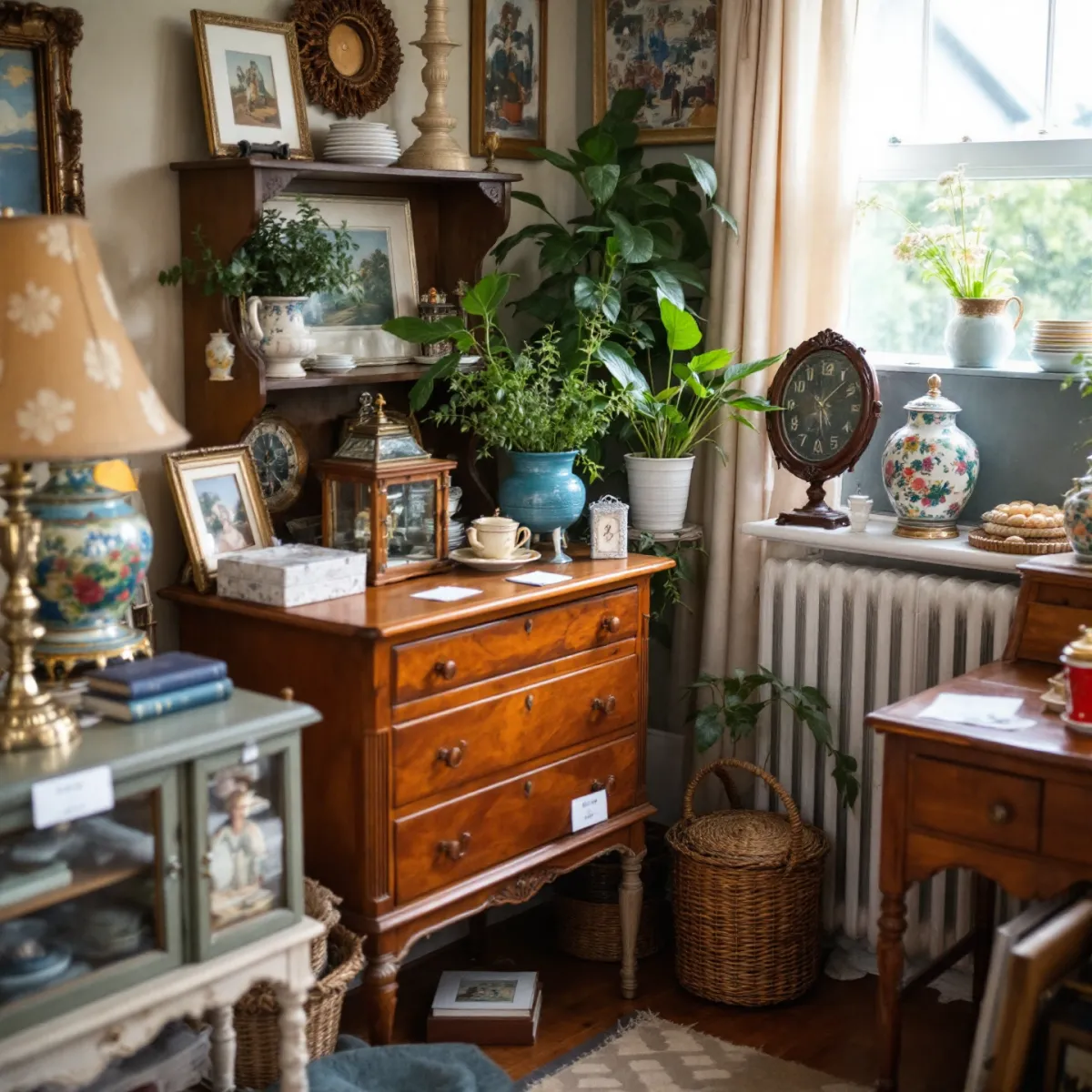Estate Sales Services
Transforming a lifetime of possessions into financial resources with dignity and care

Hidden Value in Everyday Treasures
What if the china cabinet that's been in your dining room for decades is worth thousands?
What if those vintage records in the attic could fund a month in your new retirement community?
What if the tools in the garage could help cover moving expenses?
When transitioning to a new chapter, the possessions you've collected over a lifetime aren't just memories—they're potential financial resources waiting to be discovered.
"An estate sale isn't just about selling items—it's about honoring the value of a lifetime's possessions while creating financial resources for your next chapter."
The Estate Sale Difference: Beyond Garage Sales and Donations
When downsizing or managing a loved one's estate, many people default to garage sales, online listings, or donations. While these approaches have their place, they often leave significant value on the table. Here's why professional estate sales offer distinct advantages:
DIY Garage Sales vs. Professional Estate Sales
Item Valuation
Guesswork and online searches
vs
Expert appraisal based on market knowledge and experience
Audience Reach
Local neighborhood
vs
Targeted marketing to collectors, dealers, and serious buyers
Presentation
Items often displayed haphazardly
vs
Professional staging to showcase items' value and appeal
Time Investment
Weeks of sorting, pricing,
and managing
vs
Minimal time requirement from you
Emotional Burden
Direct involvement in selling
family treasures
vs
Professional buffer between
you and buyers
Financial Return
Often significantly undervalued
vs
Maximized value through expert pricing and negotiation
"I was planning to donate most of my mother's belongings when Talesa suggested an estate sale. I was shocked when the sale generated over $14,000—money that helped cover moving expenses and gave Mom a financial cushion for her new apartment. Items I thought were worthless turned out to be valuable to collectors."
— Jennifer K., daughter of client, Sun City
A Dignified Approach to Estate Sales
My approach to estate sales focuses on maximizing value while maintaining dignity and respect for both the possessions and the people involved. Through my network of trusted estate sale professionals, I coordinate a comprehensive process:

◉ Initial Consultation
We begin with a thoughtful conversation about your goals, timeline, and specific concerns. I'll help you determine if an estate sale is the right approach for your situation.
◉ Professional Assessment
An experienced estate sale professional will evaluate your items, identifying potentially valuable pieces and providing a realistic estimate of the sale's potential.
◉ Pre-Sale Preparation
The team will organize, clean, research, and price items to maximize their appeal and value. They'll also handle marketing to attract the right buyers.
◉ Professional Sale Management
Experienced staff will handle all aspects of the sale, from security and crowd management to negotiations and transactions, allowing you to maintain distance from the process.
◉ Post-Sale Services
After the sale, you'll receive detailed accounting and proceeds. The team can arrange for donation or disposal of unsold items, leaving the property clean and ready for the next steps.
The Talesa Difference: Coordination and Advocacy
What sets my estate sale services apart is my role as your advocate and coordinator. While I partner with professional estate sale companies to conduct the actual sales, I remain involved throughout the process to ensure your interests are protected:
I help you select the right estate sale company for your specific needs and situation
I ensure clear communication between you and the estate sale professionals
I coordinate the estate sale timing with other aspects of your transition
I provide guidance on which items to sell, keep, or handle differently
I monitor the process to ensure it aligns with your goals and values
This approach gives you the benefit of professional estate sale expertise while maintaining a trusted advocate who understands your overall transition journey.
Unexpected Treasures: Items That Often Have Hidden Value
Many seniors are surprised to discover the value in everyday items they've owned for decades. Here are some categories that often yield unexpected returns:
Mid-Century Modern Furniture
Guesswork and online searches
vs
Expert appraisal based on market knowledge and experience
Vinyl Records
Local neighborhood
vs
Targeted marketing to collectors, dealers, and serious buyers
Vintage Cameras
Items often displayed haphazardly
vs
Professional staging to showcase items' value and appeal
Vintage Kitchenware
Weeks of sorting, pricing,
and managing
vs
Minimal time requirement from you
Quality Tools
Direct involvement in selling
family treasures
vs
Professional buffer between
you and buyers
First Edition Books
Often significantly undervalued
vs
Maximized value through expert pricing and negotiation

Free Resource:
"Estate Sale Preparation Guide"
To help you prepare for a potential estate sale, I've created a comprehensive guide that includes:
Checklist for determining if an estate sale is right for your situation
Tips for identifying potentially valuable items before the professionals arrive
Questions to ask when interviewing estate sale companies
Timeline and preparation guidelines
Tax considerations for estate sale proceeds

Ready to Discover the Hidden Value
in Your Possessions?
I invite you to schedule a no-obligation consultation to discuss your specific situation and how estate sale services might benefit your transition.
During this conversation, we'll explore your goals, timeline, and the potential value of your possessions.
Frequently Asked Questions About Estate Sales
How do I know if an estate sale is right for my situation?
Estate sales are typically most beneficial in these situations:
✔️ Volume of items: You have a substantial amount of furniture, collectibles, household goods, tools, or other saleable items.
✔️ Value potential: Your possessions include antiques, quality furniture, collectibles, art, jewelry, or other items with potential market value.
✔️ Time constraints: You need to liquidate contents relatively quickly due to a move, property sale, or other deadline.
✔️ Physical limitations: You're unable to manage the physical demands of sorting, pricing, and selling items yourself.
✔️ Emotional considerations: You prefer not to personally handle the selling of family possessions due to emotional attachment.
Estate sales may not be the best option if:
✔️ You have only a few valuable items (in which case, consignment or specialty dealers might be better)
✔️ Most items are damaged, in poor condition, or of minimal value
✔️ Your homeowners association prohibits estate sales
✔️ You need to vacate the property immediately
During our initial consultation, I can help assess your specific situation and recommend whether an estate sale would be beneficial or if alternative approaches might better serve your needs.
How much can I expect to make from an estate sale?
Estate sale proceeds vary widely based on several factors:
✔️ Quality and condition of items: Well-maintained, high-quality items naturally command higher prices.
✔️ Age and rarity: Antiques, collectibles, and rare items often generate more interest and higher bids.
✔️ Current market trends: Market demand fluctuates—what was valuable a decade ago may not be today, and vice versa.
✔️ Location: Sales in affluent areas or locations with easy access typically attract more buyers.
✔️ Marketing and presentation: Professional staging and targeted marketing significantly impact results.
✔️ Timing: Seasonal factors and competing events can affect attendance.
As a general guideline:
✔️ A modest home with standard furnishings might generate $3,000-$8,000
✔️ A larger home with quality furnishings might yield $8,000-$15,000
✔️ Homes with antiques, collections, or high-end items can sometimes generate $15,000-$50,000+
During the assessment phase, the estate sale professional will provide a realistic estimate based on your specific items. Remember that even if individual items sell for less than their original purchase price, the cumulative value of selling many items often creates a significant financial resource.
How are estate sale companies compensated?
Most estate sale companies use one of these compensation models:
Commission-based (most common):
The company receives a percentage of the total sales
Typical commission rates in the Menifee area range from 30-40%
Higher-value estates may qualify for lower commission rates
This model aligns the company's interests with maximizing your sale proceeds
Flat fee:
A set amount regardless of sales total
May be appropriate for smaller estates or when sales potential is limited
Typically ranges from $1,500-$4,000 depending on the size and complexity
Minimum guarantee:
Some companies offer a guaranteed minimum amount you'll receive
This provides certainty but may result in lower overall returns if the sale exceeds expectations
Additional considerations:
Setup and cleanup fees may be charged separately or included in the commission
Credit card processing fees (typically 3-4%) may be deducted from proceeds
Advertising costs are usually covered by the company but confirm this in advance
Disposal fees for unsold items might be an additional charge
I work with several reputable estate sale companies with different fee structures and can help you select one that best fits your situation. All terms will be clearly outlined in a written contract before any work begins.
How long does the estate sale process take?
The estate sale timeline typically follows this schedule:
Pre-Sale Phase: 1-3 weeks
Initial consultation and assessment: 1-2 days
Contract signing and scheduling: 1-3 days
Preparation and setup: 3-10 days (depending on volume and complexity)
Sorting and organizing items
Researching values and pricing
Cleaning and staging
Photographing items for marketing
Creating advertising and online listings
Sale Phase: 1-3 days
Most estate sales run Friday through Sunday
Some larger estates may require an additional day
Typically 8-9 hours each day (e.g., 8am-4pm)
Post-Sale Phase: 1-3 days
Accounting and payment processing: 1-2 days
Removal of unsold items: 1-2 days
Final cleaning: 1 day
Total timeline: From initial consultation to final cleanup, the entire process typically takes 2-4 weeks.
This timeline can be adjusted based on your specific needs and circumstances. If you're facing a tight deadline, some companies can expedite the process. Conversely, if you have more time, a longer preparation period often results in better organization and potentially higher sales.
What happens to items that don't sell?
After an estate sale concludes, you have several options for handling unsold items:
1. Donation:
⦿ Many estate sale companies have relationships with charitable organizations
⦿ They can arrange for pickup of remaining saleable items
⦿ You may receive tax deduction documentation for donated items
⦿ Common donation recipients include Goodwill, Salvation Army, Habitat for Humanity ReStore, and local charities
2. Consignment:
⦿ Higher-value unsold items may be suitable for consignment shops
⦿ This extends the selling period but may result in better prices for select pieces
⦿ Typically involves an additional commission to the consignment store
3. Secondary sale:
⦿ Some companies offer a "fill-a-bag" or heavily discounted second-day sale
⦿ Dealers or liquidators may make bulk offers on remaining items
⦿ This typically generates minimal additional revenue but reduces disposal needs
4. Disposal:
⦿ For items that cannot be sold or donated, disposal services can be arranged
⦿ This may involve additional fees depending on volume and your contract terms
⦿ Environmentally responsible disposal methods are prioritized when possible
5. Retention:
⦿ You always have the option to keep any unsold items
⦿ Some clients choose to review unsold items for any they wish to reclaim
The handling of unsold items should be clearly addressed in your contract with the estate sale company. Most of my partner companies include basic clean-out services in their fee, ensuring you don't have to worry about the logistics of removing remaining items.
Should I remove items before the estate sale professionals arrive?
Before the estate sale team arrives, you should remove only specific categories of items:
Items to remove before the assessment:
✔️ Personal documents: Financial records, medical information, personal correspondence, and legal documents
✔️ Medications: Prescription and over-the-counter medications should be properly disposed of
✔️ Family photos and albums: Unless they have historical or collectible value
✔️ Items with sensitive personal information: Computers, phones, and devices with personal data
Specific keepsakes: Items you've definitely decided to keep or distribute to family members
Items to leave for professional assessment:
✔️ Items you're uncertain about: Let the professionals help determine value before deciding
✔️ Items that appear ordinary: Sometimes everyday items have unexpected value
✔️Collections: Often worth more when sold as complete sets
✔️ Furniture: Even if you think it has little value
✔️ Artwork and decorative items: These can be difficult for non-experts to value
✔️ Tools and workshop items: Often in high demand at estate sales
✔️ Kitchen items: Vintage kitchenware can have surprising value
One of the most common mistakes is removing items before professional assessment, only to discover later they had significant value. Estate sale professionals are trained to identify valuable items that might look ordinary to the untrained eye.
During our initial consultation, I can provide guidance on what to keep, what to set aside for family distribution, and what to leave for the estate sale assessment.
Are there tax implications from estate sale proceeds?
Estate sale proceeds may have tax implications depending on your specific situation:
For the original owner selling their own possessions:
✔️ Capital gains: Most household items sell for less than their purchase price, resulting in no taxable gain
✔️ Collectibles and appreciating assets: Items that sell for more than their purchase price may be subject to capital gains tax (typically 28% for collectibles)
✔️ Documentation challenges: Proving original purchase price (cost basis) can be difficult for long-held items
✔️ Personal-use property loss: Losses on personal items (selling for less than purchase price) are generally not tax-deductible
For estate representatives selling a deceased person's possessions:
✔️ Step-up in basis: Inherited items receive a "step-up" in basis to their fair market value at the date of death
✔️ Capital gains: Only applies if items sell for more than their value at the date of death
✔️ Estate tax considerations: For larger estates subject to estate tax, proper valuation is important
For both scenarios:
Income reporting: Estate sale proceeds are not typically considered income unless items sell for more than their basis
Documentation: Keep detailed records of the sale, including the inventory list and final accounting
State tax considerations: Some states have different rules regarding estate sales and inheritance
I recommend consulting with a tax professional about your specific situation, especially if:
✔️ The estate sale includes high-value items
✔️ You're selling items that have appreciated significantly
✔️ You're handling an estate subject to estate tax
✔️ The total proceeds are substantial
I can connect you with tax professionals who specialize in senior transitions and estate matters to ensure you understand any potential tax implications before proceeding with an estate sale.
How do you ensure the security of my home and possessions during the estate sale?
Security is a top priority during estate sales. The estate sale companies I partner with implement these comprehensive security measures:
Before the sale:
✔️ Thorough inventory: Detailed documentation of valuable items with photographs
✔️ Secure storage: High-value items like jewelry and small collectibles are often kept in locked display cases
✔️ Limited access: Only authorized personnel have access during setup
Property security: All entry points are secured when staff is not present
During the sale:
✔️ Controlled entry: Customers sign in and may be required to show ID
✔️ Limited capacity: Number of shoppers allowed in at one time is controlled
✔️ Staffed rooms: Personnel are stationed throughout the home, especially in areas with valuable items
✔️ Secured areas: Rooms or areas not included in the sale are locked or blocked off
✔️ Checkout control: All purchases go through a central checkout area
✔️ Security personnel: For higher-value estates, dedicated security staff may be employed
✔️ Bag checks: Some companies check bags upon exit
After hours:
✔️ Complete lockdown: All doors and windows secured
✔️ Alarm systems: Existing home security systems remain activated
✔️ Temporary security: Additional measures may be implemented between sale days
Insurance protection:
✔️ Reputable estate sale companies carry liability insurance
✔️ Some offer additional coverage for high-value estates
✔️ Your homeowner's insurance typically remains in effect, but check with your provider
I personally vet all estate sale companies I recommend, ensuring they have established security protocols and a track record of responsible management. Security measures are discussed in detail during the planning phase and documented in your contract.

TALESA AGUIRRE
SRES® - Senior Real Estate Specialist
CA DRE 02202185
This site and the products and services offered on this site is in no way sponsored, affiliated, endorsed or administered by, or associated with, Facebook™ or Google™. Nor have they been reviewed tested or certified by Facebook™.
You understand that you are providing your information to Talesa Aguirre - Senior Transition Specialist and not to Facebook™ or Google™. The information you provide will only be used by Talesa Aguirre - Senior Transition Specialist.
© Copyright 2026. Talesa Aguirre - Real Estate Agent. All Rights Reserved. Privacy Policy | Terms and Conditions